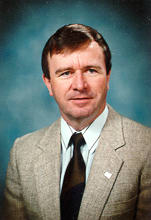 The
beginning of a new school year always reminds me that one of the most
important skills we can develop within children is the ability to cope
with change. As I look around at my new students, I see a great deal of
apprehension in some of their faces. Some have just moved into the area
and are thrust in among 25 or 30 strangers. Others have been in the same
class with their best friend for years and are now separated. I also
recall colleagues who have retired or who have transferred to other
schools or positions. While I am pleased that these people are moving on
to new, exciting opportunities, it doesnít make it any easier to say
goodbye.
The
beginning of a new school year always reminds me that one of the most
important skills we can develop within children is the ability to cope
with change. As I look around at my new students, I see a great deal of
apprehension in some of their faces. Some have just moved into the area
and are thrust in among 25 or 30 strangers. Others have been in the same
class with their best friend for years and are now separated. I also
recall colleagues who have retired or who have transferred to other
schools or positions. While I am pleased that these people are moving on
to new, exciting opportunities, it doesnít make it any easier to say
goodbye.
It is important to learn early in life that life has a
way of throwing obstacles at us. Just when we start to get comfortable
with a person, a place or a situation, something comes along to change
it. A friend moves away. A child graduates and takes a job in another
city or gets married. Unexpected expenses arise which force you to use
savings that were set aside for a vacation. Or you get laid off from
work.
Our ability to cope with change and disruption
determines, to a great degree, our peace, happiness and contentment in
life. But how do we develop this ability to cope with change? How do we
help children learn this skill?
Philosophers have considered this question for
centuries. According to the author of the Book of Ecclesiastes, comfort
can be found in remembering that "to every thing there is a season,
and a time to every purpose under heaven." A friend of mine once
stated that in order to work for the government, "survivability
depends upon adaptability". I recently watched a show on television
where a California surfer summed up the answer to lifeís problems in
four simple words: "Go with the flow."
The Californian explained, "Itís like surfing.
You canít organize the ocean. Waves just happen. You ride them where
they take you, then you paddle back out there and catch the next one.
Sure, youíre always hoping for the perfect wave, but mostly you just
take them the way they come."
Perhaps the surfer has the answer we have been looking
for. Life is nothing more than a series of events - both good and bad.
No matter how good your organizational skills or how well you have
planned for all eventualities, there will always be life-influencing
factors over which you have no control. The truly successful person
expects the unexpected, and is prepared to make adjustments should the
need arise, as it almost always does.
That doesnít mean you donít keep trying to make
your plans and dreams come true. It just means that when things donít
go according to plan, you just work around them and then move on. As the
surfer said, "You ride them where they take you, then you paddle
back out there and catch the next one."
What we must all realize is that some obstacles are
easier to take than others. Missing a baseball game because of rain is
easier to take than the sudden death of a family member. But the
principle is the same. "You ride the wave where it takes you, then
you paddle back out there and catch the next wave, always searching for
the perfect ride." In other words, you work around the obstacle the
best you can and then you move on with your life.
People have often commented on my ability to remain
calm under difficult circumstances. I merely tell them that the secret
is to keep your planning to a minimum. If I have to get to Sudbury, I
will plan on taking the shortest route along Hwy 69N. But, if for some
reason I am forced to take a detour through Garson or Rayside-Balfour, I
have learned to simply enjoy the ride. I will eventually get to Sudbury.
It may take a little longer, and the road may be a little bumpier, but I
will get there. I have also learned over the years that usually when I
am forced to take a detour, I encounter some very worthwhile
life-experiences along the way that I would have missed had it not been
for taking the detour. As weird as it sounds, I actually look forward to
the unexpected. Itís like opening a Christmas present - you never know
what you are going to find.
So, when my students look back on this year, I guess I
hope that the one thing they remember most of all is that Mr. Kirwan
taught them not to fear change, but to cope with it by enjoying the ride
and then moving on with life.
Have a good week!